There will always be difficult questions to answer and dissatisfied customers to appease, but managing your support requests can be massively simplified with the right software.
I spent several weeks doing in-depth testing of dozens of customer support tools, and I learned that using the wrong app for customer support can make your team's life a lot harder. After all the time I spent with these apps, these are the nine I'd recommend. With the help of these customer service tools—each one suited for a different use case—your team can focus on what they do best: providing excellent customer support.
The 9 best customer service apps
- Zendesk for Service for support on the most platforms
-
Freshdesk for companies with field service
-
Zoho Desk for free help desk software
-
LiveAgent for a quick look at all customer interactions
-
Re:amaze for support inside web and eCommerce apps
-
UserEcho for in-depth user insights
-
Wix Answers for websites hosted on Wix
-
Help Scout for advanced inbox features
-
HubSpot Service Hub for a 360º view of customers
What makes a great customer service app?
How we evaluate and test apps
All of our best apps roundups are written by humans who've spent much of their careers using, testing, and writing about software. We spend dozens of hours researching and testing apps, using each app as it's intended to be used and evaluating it against the criteria we set for the category. We're never paid for placement in our articles from any app or for links to any site—we value the trust readers put in us to offer authentic evaluations of the categories and apps we review. For more details on our process, read the full rundown of how we select apps to feature on the Zapier blog.
If your customer support team is overworked, or it seems like you spend more time fielding customer complaints than improving your product or service, it's time to invest in some new tools. But you need to know what you're looking for to be sure the customer support software you choose will actually help you and not just complicate your process even more.
As I researched and tested help desk services, these are the criteria I was most focused on:
-
Customer self-service. This refers to all the ways customers or clients can help or educate themselves without the need for a customer service agent. Customer self-service can be done through a knowledge base, help center, community forum, or chatbot. Each app includes some sort of knowledge base tool, and I spent a lot of time testing how fast I could build a simple knowledge base and the accuracy and thoroughness of chatbot responses.
-
Personalized customer experience. Personalized customer experience (CX) means creating a connection with each customer. I paid attention to how customizable each feature was, and how you could set it up to meet the needs of different customer segments.
-
Collaborative features. Collaboration tools will help agents complete tickets quickly and efficiently—with each other's help. I checked each customer service tool for shared inboxes, file sharing, and internal knowledge bases that agents could reference.
-
Integrations. Your customer support tool needs to be able to talk to the other tools you use at your company. After all, the best customer service doesn't happen in a vacuum—it's connected to all the moving parts of your business.
-
Advanced features. While I didn't require that every app offer every feature, I kept my eye out for advanced features like live chat, video chat, screen sharing, advanced AI conversations, help in multiple languages, app customizations, and more.
-
Value for price. For all the apps featured here, the price is justifiable for the features offered and the target customer base.
These criteria—and my experience testing the apps—helped me narrow it down to nine apps that are best for a holistic customer support experience: a combination of help desk software, knowledge base software, and other advanced tools.
The best customer service software for support on most platforms
Zendesk for Service (Web, Android, iOS)
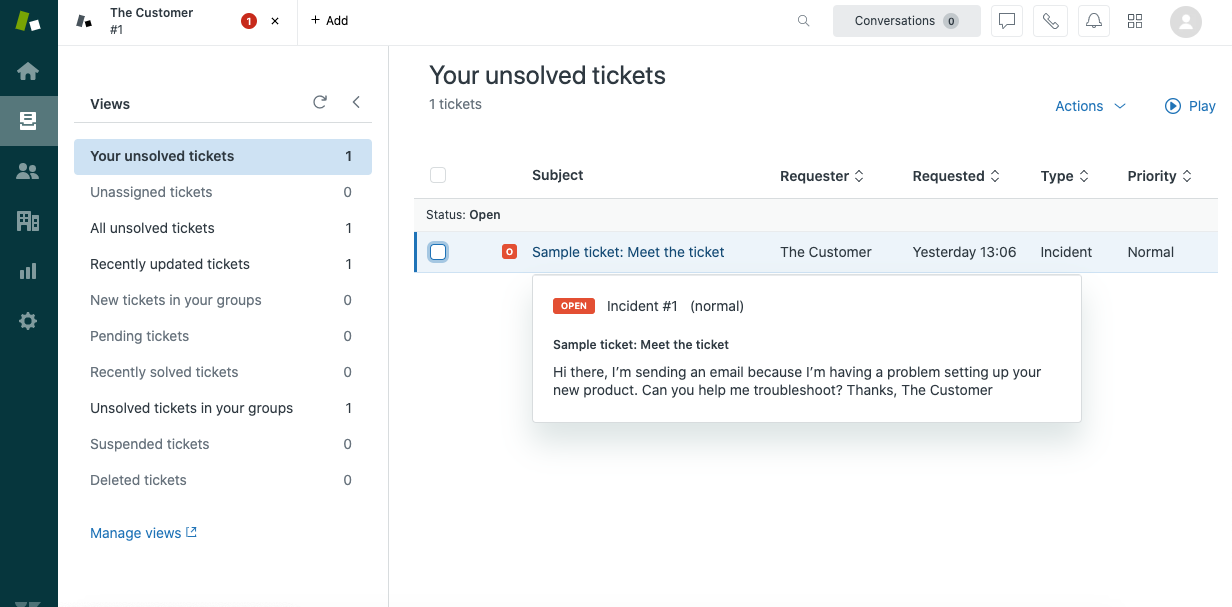
Today, we expect customer support on a variety of platforms: email, Twitter, Facebook Messenger, phone, SMS, WhatsApp, and more. Tomorrow, who knows which channels or social media networks will be the most popular. Zendesk for Service is designed for you to help your customers across platforms, and it's frequently updated to support new networks.
That's a big reason why Zendesk tops our list. With a contemporary and sleek user interface (UI), I could easily follow conversations across channels, without having to leave my browser. This means customers can connect anytime, anywhere, on any channel, and get the same level of service from me. And one feature that really stood out to me (something none of the other apps on this list has): you can preview messages without opening the ticket. I hovered my mouse over the message and got a quick snippet. It saved me so much clicking time.
Zendesk is designed to help manage your support queues by letting customers help themselves. When someone wants to ask a simple question, they'll be redirected to your knowledge base, where Zendesk will show articles that may answer their question.
I was also impressed at the level of customizations that their chatbot offers. If users have complex questions, they can chat with live agents and AI bots at the same time. You can also add third-party tools into your chatbot for banking, eCommerce, and even gaming to provide a more personalized CX. Best of all, help for Zendesk is available in 40+ languages, and its built-in guided tour with videos helped me navigate the comprehensive set of tools.
I'll be honest—it's expensive. But between the call center, the customizations for the knowledge base, chatbot, and reporting, the pricing is absolutely justified. And if these features still aren't enough for you, Zendesk Marketplace has over 1,300 apps to integrate with, or you can always build your own Zendesk apps.
Zendesk also integrates with Zapier, so you can do things like create new Zendesk tickets from form submissions, or add new Zendesk tickets meeting certain criteria to your project management app. The workflows below are some examples, but you can connect thousands of apps, regardless of your tech stack.
Zendesk price: From $49/month/agent, billed annually, for the Suite Team plan.
Best customer service software for companies with field service
Freshdesk (Web, iOS, Android)
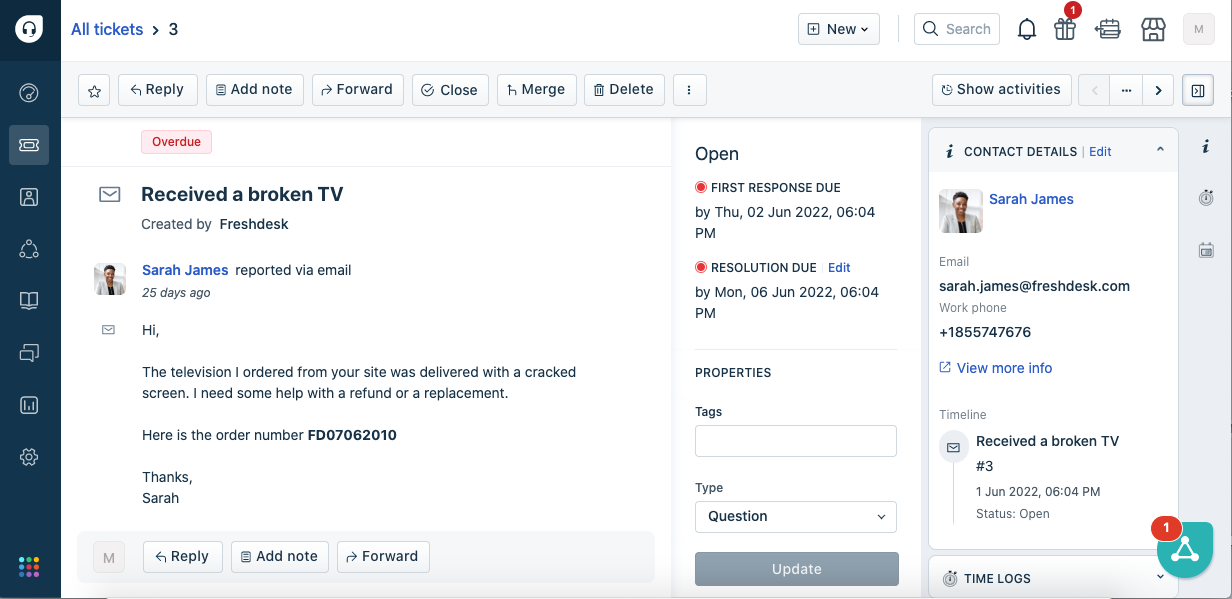
Customer support for field service can be difficult. You have to coordinate customers and field technicians (e.g., electricians, locksmiths, plumbers) and handle issues in real-time.
While Freshdesk (from Freshworks) can be used by teams of any kind, it's my #1 recommendation for a customer support app for companies who need field service management. It has built-in service level agreements (SLAs), policies that make sure field service support is prioritized correctly. It also indicated for me which support channels, user levels, or technicians should get the fastest help, by marking tickets as increasingly important based on wait time or urgency. There's even a live tracking feature, so you know your technicians' locations at all times.
But it doesn't stop there—Freshdesk also assigns tickets based on an agent's skillset and workload. That way, when field technicians need help, the app will direct them to the right customer support rep, or AI can even suggest responses based on ticket history. And after I answered a question, the app turned my responses into knowledge base articles, making it super easy for me to build a help center without manually writing out a new question-and-answer page.
Freshdesk also integrates with Zapier, so you can connect it with your scheduling tools—and any other apps you use to keep track of appointments, jobs, and technicians.
Freshdesk price: Free plan available for 10 agents/month; from $18/month/agent for the Growth plan + $29/month per technician for the field technician add-on.
Best free help desk software
Zoho Desk (Web, iOS, Android)
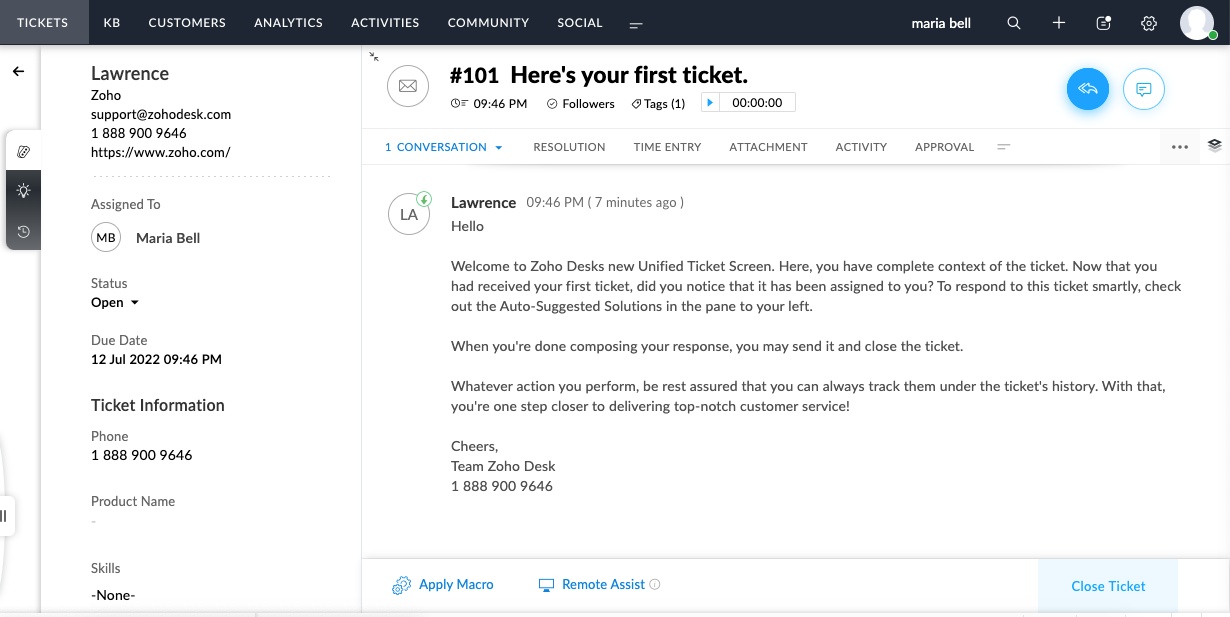
Anyone familiar with Zoho's CRM will be right at home on Zoho Desk, as it uses a similar interface and integrates with all the Zoho apps. But its star feature is that it lets you build a full customer support center for free.
Just by signing in with a Zoho account, you can set up a customer support center with email, documentation, a user forum, and 24/7 support for up to three agents. Then, if you want to add a social network integration, chat, or phone support, or tie it into Zoho CRM, you can upgrade to a paid account. It's one of the cheapest ways to get your support center off the ground, without leaving behind any of the features you'd expect from a customer support app.
My favorite feature was the team feed, where agents can update each other and share news and comments—it felt just like using a Slack channel. There's also an agent collision detector to prevent multiple agents from unknowingly working on the same case.
Zoho Desk does have its share of drawbacks. Unfortunately, I didn't find it to be the most user-friendly solution on the list. For example, when I was building a mock help center, it was challenging for me to figure out how to find and deploy all the features I needed. But given that it's free, I can forgive that. It's worth checking out for the free support center alone; plus, there's a community forum, custom reporting, and basic time tracking.
You can also connect Zoho Desk to Zapier, so you can add new contacts as subscribers, send live chat conversations to Zoho Desk, and more. Here are just a couple examples to get you started.
Zoho Desk price: Free plan available for 3 agents; from $14/month/user billed annually for the Standard plan.
Best customer service software for a quick look at all interactions
LiveAgent (Web, iOS, Android)
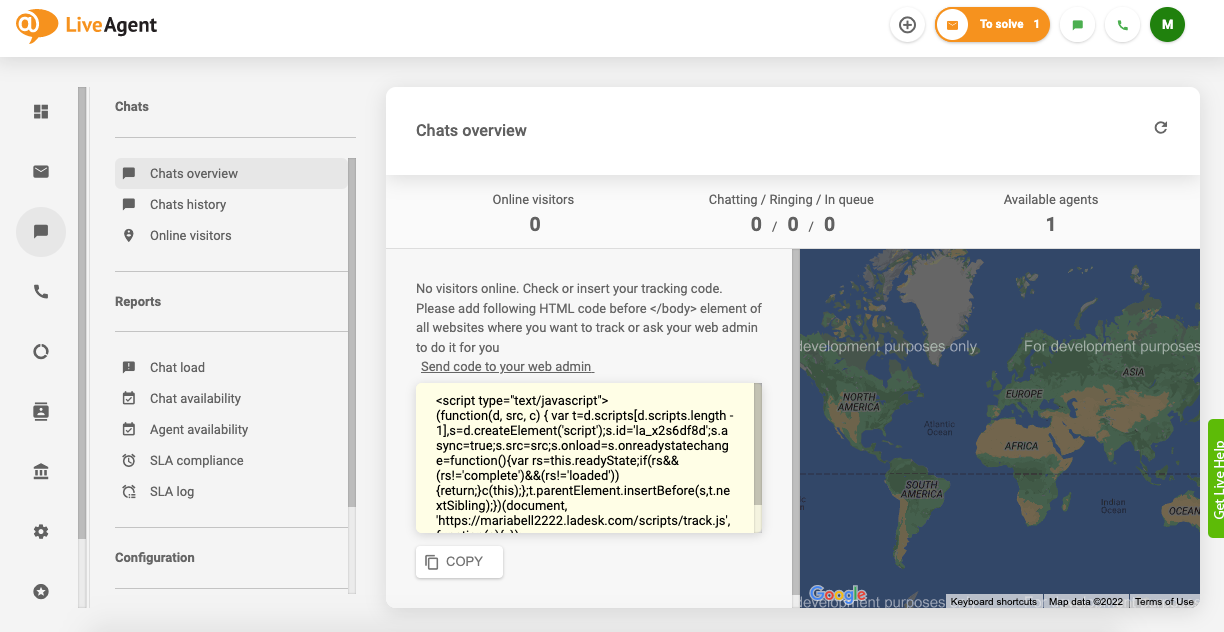
As a customer support agent, you know it can be extremely challenging to respond to a support ticket well without knowing the full context. At the same time, a question that appears difficult on the surface might become much easier as soon as you see the customer's previous interactions with the rest of your team. LiveAgent makes this simple by pulling every interaction your team has with a customer into a continuous, chat-like thread. You'll see their previous emails, chat sessions, and more—everything they've ever talked about with your team in one place, to make solving today's issue easier.
LiveAgent is focused on real-time support, with a live chat widget for your site and SLAs to ensure your best customers get on-time support. It tracks customers throughout your knowledge base and chat widget, giving you more contextual insights on their behavior and issues. Plus, navigating the app was a breeze.
I can also see this app stopping me from burning out, by letting me set my own schedule and close the queue to new tickets when I'm out of the office. Since all interactions are in one place, my other team members could pick up where I left off, and I could jump back in and tackle new tickets without leaving anyone waiting.
To get even more insights, connect LiveAgent with Zapier, so that your customer support tool can talk to all the other apps you use for customer interactions. Here are a couple workflows to give you an idea of how it works.
LiveAgent price: Free plan available for 1 agent/month; from $15/month/agent for the Ticket plan.
Best customer service software for support inside web and eCommerce apps
Re:amaze (Web, iOS, Android)
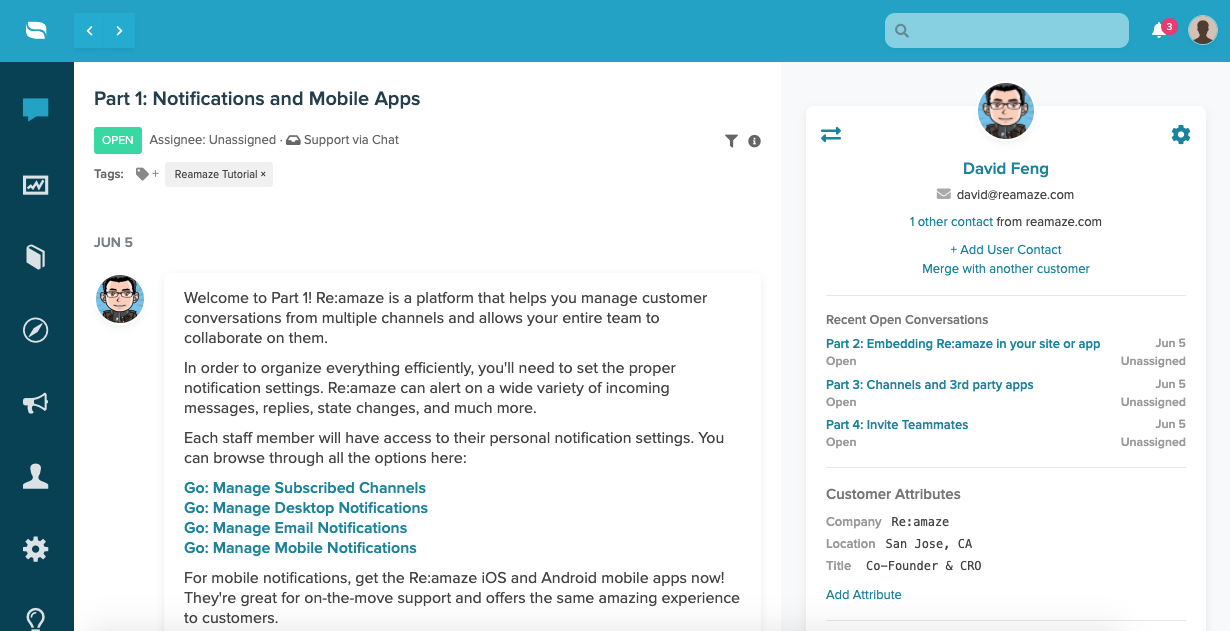
Email isn't always the quickest way for your customers to get their problems solved—Re:amaze (by GoDaddy) can help them get answers right inside your app. When you build your help docs in Re:amaze, you can take advantage of its drag-and-drop-style "power editor," then embed your content into your website or app, right alongside Re:amaze's chat widget. Whenever your customer gets in touch, you'll see their account inside your app, with all the data on their past purchases and support tickets, so you never have to ask for extra info.
I appreciated the shared status page for agents and customers. The customer support app lets you know when there's a shortage or technical difficulty—considerate for both parties.
Re:amaze integrates with eCommerce platforms and also offers a chatbot and live chat option. There's a shared inbox, but honestly, I wasn't too impressed with their collaboration features—they're pretty basic. Luckily, you can connect Re:amaze to Zapier to add more collaboration to your support center.
Re:amaze price: From $29/month/user for the Basic plan
Best customer service software for in-depth user insights
UserEcho (Web)
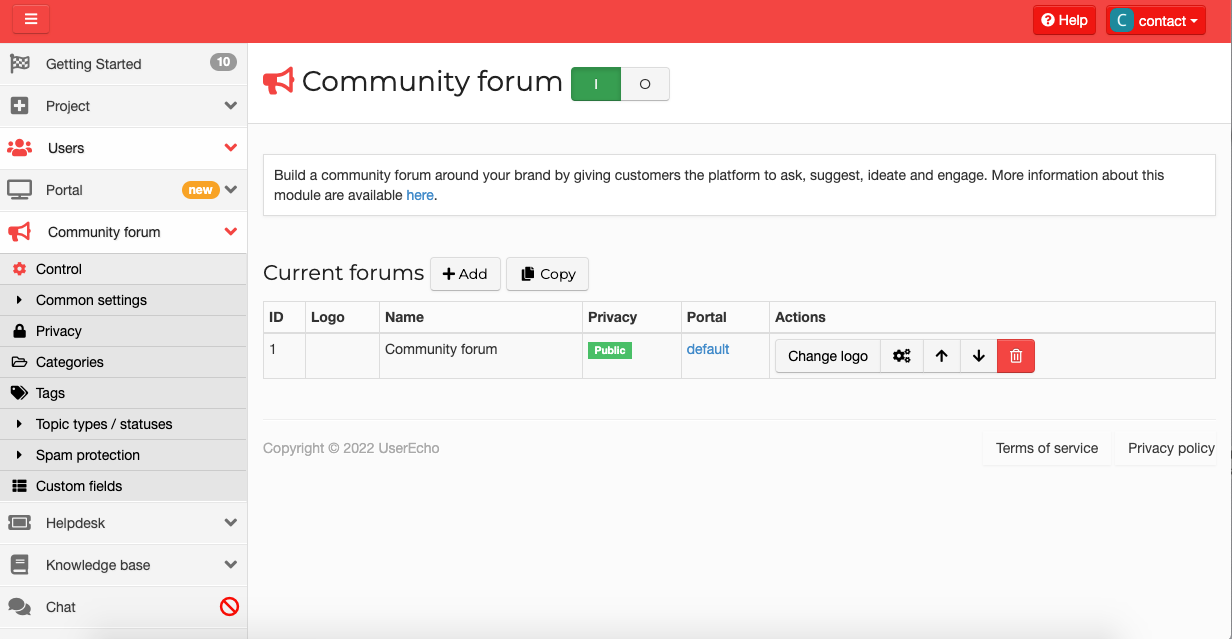
Every time a customer creates a support ticket, they're also doing something else: telling you about new features they'd like to see or bugs that need to be fixed. In UserEcho, each support ticket is like a vote, a reminder of what should be changed or fixed.
UserEcho is a forum-focused support tool where users can ask for new features, add comments and thoughts about them, and upvote their favorite ideas. Each new comment and vote will show up in your email support queue, along with the rest of your support emails, so you'll never forget about the things that are most important to your users. And the customer support app gave me plenty of information about my users: type of web browser, screen resolution, navigation history, and so on. With this information, I'd feel confident being able to solve advanced technical issues.
The drawbacks: its knowledge base isn't the easiest to set up, the UI is a little cluttered and dense, and the sheer number of options and settings made it take longer to add basic design features or find the tools I needed when I was testing it. The app does offer to do your branding for you, but it'll cost $500. Having said that, there's a free support center, and the community forum will deliver great insights once you get it up and running.
UserEcho connects with Zapier, so you can make sure it's talking to your other tools that deliver user insights, like survey apps or email marketing tools.
UserEcho price: From $25/month/user for the Universal plan.
Best customer service software for websites hosted on Wix
Wix Answers (Web)
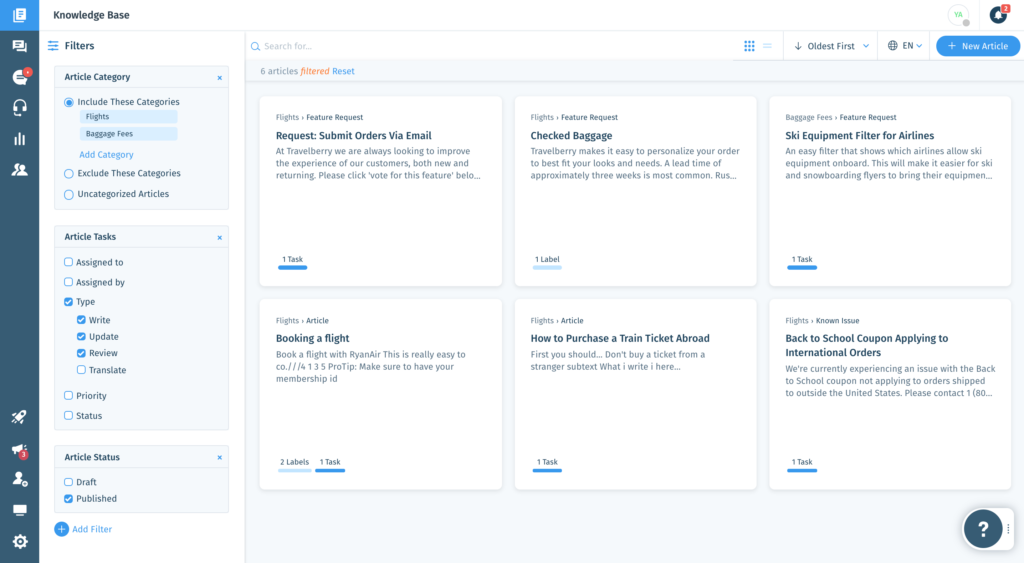
When it comes to customer support platforms, Wix Answers is in a class of its own. Here's what makes it unique: Wix Answers is built into the Wix platform, so you can seamlessly integrate it with your website. This means that you can use your existing branding and color scheme, without doing more configuration to your knowledge base or help center. I've built several Wix websites before, so using this app was a breeze for me.
Designed for intuitiveness, Wix Answers has an easy-to-build knowledge base. I quickly added questions to my help center using a drag-and-drop model (my favorite), and formatting articles wasn't too difficult or cumbersome. With Wix Answers, you can also create custom forms to collect information from your customers. This is perfect for gathering feedback or conducting surveys. And because the forms are fully customizable, you can collect any type of information you need to personalize the user's experience—and your insights.
Wix Answers is the no-brainer option for companies that host their sites on Wix. You'll already be familiar with how to build, design, and customize your help center—plus, there's a built-in call center, live chat, and great insights and reporting.
Wix integrates with some major apps, like Shopify and Salesforce, but if you connect it to Zapier, you can tap into thousands of more apps to improve your personalized customer experience.
Wix Answers price: From $24/month/user.
Best customer service software for advanced email inbox features
Help Scout (Web, iOS, Android)
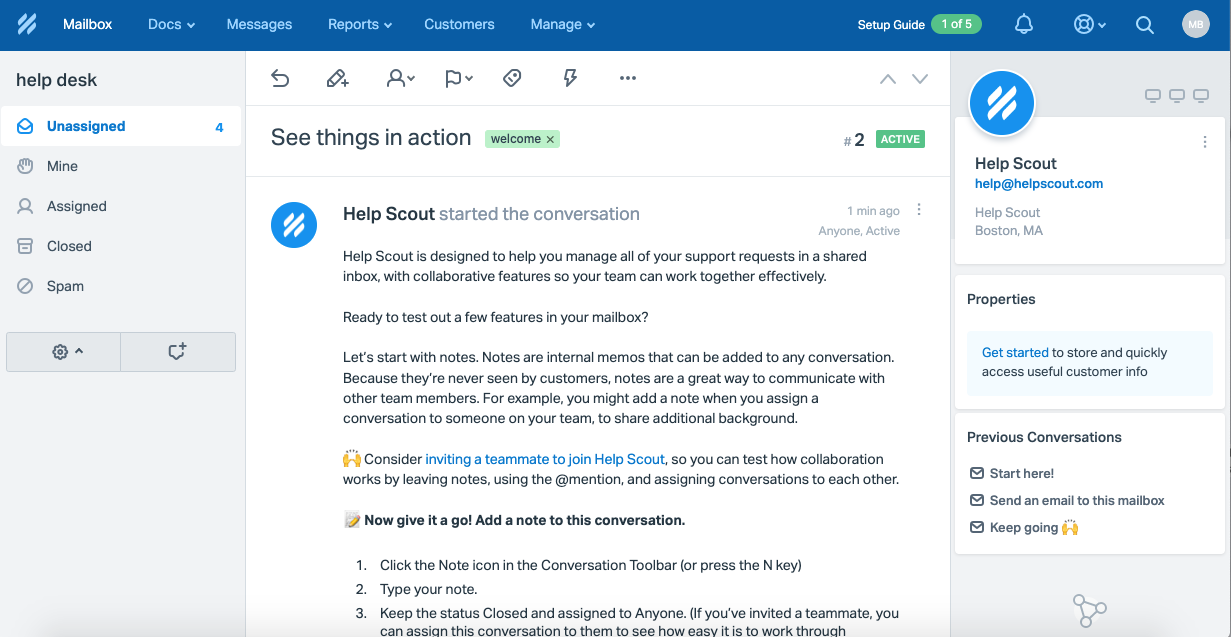
Help Scout is all about easily managing email communications with customers. The service offers a variety of advanced email inbox features that make it easy to stay organized and respond quickly to customer inquiries. Create custom email templates, automatically CC or BCC multiple email addresses, set up automatic follow-ups, add a note to an email, and even set up reminders. You can also use Help Scout to track who opens your emails and when, so you can gauge the effectiveness of your communications.
I was impressed with Help Scout's knowledge base templates; they were beautiful and would save me time from fiddling around and creating pages from scratch. It also has an internal knowledge base, which agents can reference to stay on track with customer support procedures.
Once I saw Help Scout offered live classes, I knew it had to be added to the list. It's the only app I came across for which you can actually get in-person, on-site training for your agents, so they're equipped to make the most of the software. If you need advanced email inbox features with a shared inbox that's clean and crisp—if minimal—this software has you covered.
You can connect Help Scout to Zapier to turn tickets into tasks, share new tickets with your team wherever they spend their time, and more. Here are some ideas to get you started.
Help Scout price: From $20/month/user for the Standard plan.
Best customer service software for a 360º view of customers
HubSpot Service Hub (Web, iOS, Android)
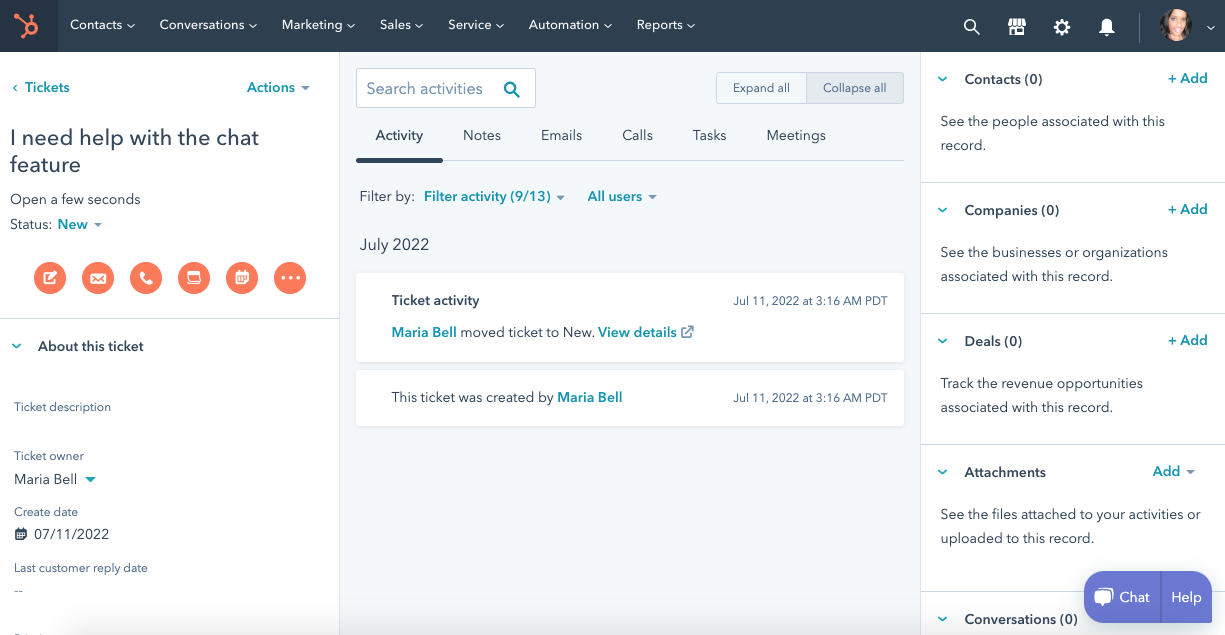
If you use HubSpot for anything else—sales, marketing, or operations—HubSpot Service Hub will give you a complete picture of every interaction a customer has had with your company, across all departments. You'll have an inbox shared by Support, Marketing, and Sales, which will make your customer experience feel seamless and allow you to provide personalized customer support at every touchpoint.
Confused about HubSpot's various hubs? Here's a rundown.
HubSpot has all the standard features you'd expect from a customer support app—and met all the criteria I laid out above—but it definitely took me some time to maneuver around the app comfortably. I not only had to learn how to work in the support app, but I needed to be familiar with sales and marketing terminology too. Of course, if you're already using HubSpot, this shouldn't be an issue. Service Hub is built on the HubSpot CRM platform, so if you have a working knowledge of the CRM, then you'll get the most out of it.
Overall, Service Hub will deliver incredibly rich profiles for you—which means a better experience for your customers. And you can connect HubSpot to Zapier to automatically find, create, or update a ticket when trigger events happen in the other apps you use most.
HubSpot Service Hub price: From $20/month for 2 agents for the Starter plan.
This article was originally published in December 2015 by Matthew Guay, and was most recently updated in July 2022.